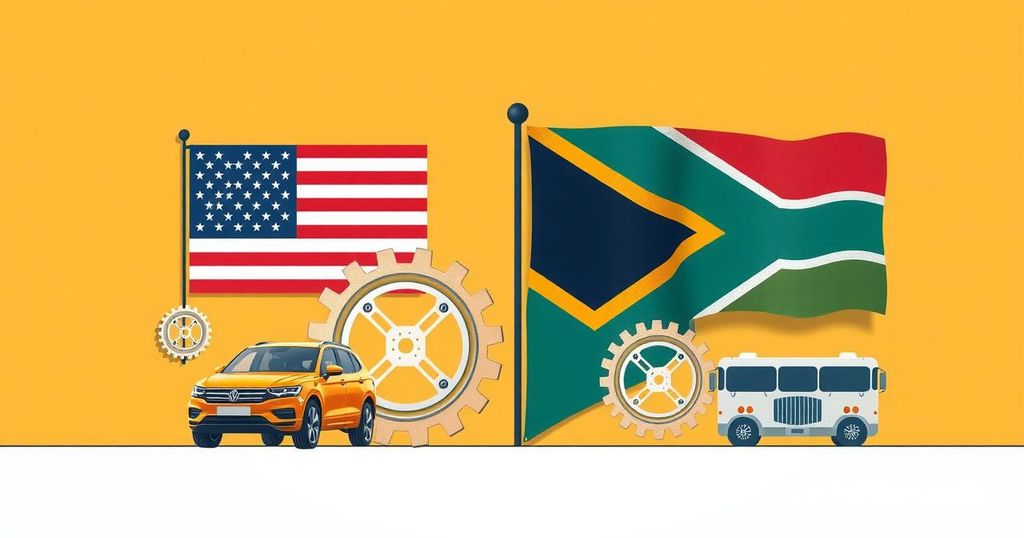South Africa Initiates US Trade Talks Amid Looming Automotive Tariffs

South Africa’s trade ministry is set to negotiate with the US regarding new 25% tariffs on automobile imports that could harm its economy. Currently benefiting from AGOA, the country fears losing duty-free access. South African automotive exports significantly contribute to GDP and employment, yet represent a small share of US imports. The nation may seek a bilateral trade agreement to offset potential losses.
South Africa’s trade ministry plans to initiate discussions with the United States as the automotive sector prepares for significant ramifications from impending tariffs. Starting April 3, a 25% levy on automobile imports will be enacted by Washington, which claims these measures address national security threats. This new taxation could potentially harm local automotive manufacturing and the broader economy, as stated by the Department of Trade, Industry and Competition (DTIC).
Currently, South African vehicles benefit from duty-free entry into the US due to a preferential trade arrangement. However, the new tariffs will negate this advantage, which the DTIC warns could lead to negative economic consequences. Under the African Growth and Opportunity Act (AGOA), a crucial tool for trade, South Africa’s auto exports represented 64% of its total shipments to the US, valued at approximately $2.4 billion last year.
The automotive sector significantly contributes to South Africa’s economy, making up over 5% of the gross domestic product and providing employment to more than 116,000 individuals. Nonetheless, the country’s auto exports constitute only 0.99% of total US vehicle imports and 0.27% of auto parts; therefore, it is argued that they do not pose any threat to US industry.
The DTIC expressed uncertainty regarding the applicability of the new US duties on South African shipments under AGOA, anticipating they likely will apply based on previous rulings on steel and aluminum tariffs. These tariffs, justified under section 232 of the Trade Expansion Act of 1962, have national-security roots.
The Automotive Business Council (Naamsa), which includes major firms like Volkswagen and Toyota, is engaging with the DTIC and the Department of International Relations and Cooperation to advocate for exemptions from these tariffs.
In response to the potential loss of preferential access, South Africa’s government plans to propose a bilateral trade agreement with the US, believing such a framework would be more beneficial than reliance on AGOA. This initiative comes amid strained US-South Africa relations following President Trump’s return to office and criticism of South Africa’s policies regarding land and foreign relations, especially concerning Iran and the International Court of Justice.
In summary, South Africa faces potential economic repercussions due to the US’s upcoming 25% tariffs on automobile imports. The trade ministry aims to start negotiations with the US to mitigate these impacts, particularly on its crucial automotive sector, which greatly contributes to the national economy. With the existing AGOA benefits under threat, South Africa is exploring alternative bilateral agreements to sustain favorable trade relations.
Original Source: www.newzimbabwe.com




